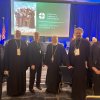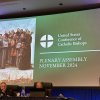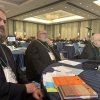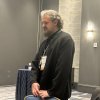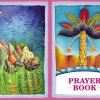A presentation of Bishop Maxim of Los Angeles at the United States Conference of Catholic Bishops held in Baltimore, November 12, 2024
I am deeply grateful for the opportunity to participate in the United States Conference of Catholic Bishops. It is a great honor to stand before you and discuss the significance of the First Ecumenical Council held in Nicaea in 325 AD—an event that marked the beginning of a transformative era for the Church.Allow me to begin by offering a few words on the historical context of the First Ecumenical Council of Nicaea in 325, followed by a reflection on the messages that Nicaea continues to offer to the Church today. The Council’s call for unity in diversity serves as a powerful reminder that even in our differences, we are bound by a common purpose—the love of Christ and the mission to spread His Gospel.
I. Nicaea 325 in Historical Perspective
- Synodality: At the core of Nicaea is the idea of synodality, the concept of gathering and traveling together, as reflected in the term ‘synodos’ (with odos meaning ‘road’ and syn meaning ‘together’). Although this assembly of 318 God-bearing bishops sought to unify the Church within the Roman Empire, it did not fully resolve the theological disputes of the time. However, it modeled the conciliar process as a path to address issues such as schism and division, emphasizing unity as an ongoing journey.
- The Creed as Liturgical event: A central achievement of Nicaea was its formulation of the Creed—not merely as a dogmatic statement for academic debate but as a liturgical text, a symbol of faith to be sung and professed within our church communities.
- Trinitarian Doctrine and Uncreated Nature of the Son: The Holy Trinity is a relational reality. At the heart of the Council’s deliberations was the exploration of the Trinitarian God, affirming that the Son is consubstantial (homoousios) with the Father. This counters the claim that the Son is a created being, thereby underscoring the distinction between the created and uncreated.
- Hermeneutical Continuity: Following Nicaea, a rich theological dialogue unfolded, particularly through the neo-Nicene theology of the mid-4th century and the work of the Church Fathers. This ongoing interpretive journey culminated in the Council of Constantinople in 381, which reaffirmed and preserved Nicaea’s vision.
II. Nicaea 325 and the Church Today
Now, we are invited to bridge the historic Council of Nicaea with contemporary efforts toward unity and collaboration. Here some points for your consideration:
- Re-receiving Nicaea Today: Today, as we reflect on Nicaea, we are invited not just to recall its decisions but to “re-receive” them, understanding concepts like homoousios anew in our current context, recognizing that this Council’s legacy is both foundational and dynamic.
- Synodality in Contemporary Context: In 2013, soon after his election, Pope Francis met with a delegation from the Ecumenical Patriarchate, led by Metropolitan John Zizioulas of Pergamon. The meeting highlighted synodality as a foundational concept—a tradition deeply rooted in the Orthodox Church and one that Pope Francis recognized as essential for the life of the Catholic Church. Despite the challenges inherent in synodality—its complexities and risks—Pope Francis embraced it, and in 2022, he inaugurated a synodal process within the Catholic Church. This is a significant development, exemplifying a shared commitment to collective discernment in faith.
- Synodality and Primacy in Dialogue: As Cardinal Koch once humorously observed, ‘We Catholics have the Pope, and you Orthodox have synodality. We have an issue, but you have a problem.’ This witty remark encapsulates the dynamic between primacy and synodality—a dialectic where we can learn from each other’s strengths and address our respective challenges.
- Looking Toward the 2025 Jubilee of Nicaea: As we approach the year 2025, which marks the 1700th anniversary of the First Ecumenical Council of Nicaea, we are called to reflect on its enduring lessons. The early Church Fathers, in their encounter with Hellenistic culture, showed us that fruitful engagement with the world is possible if we wisely integrate its valuable elements into our Christian witness. Today, we face a world shaped by modern ideologies and worldviews that have their own logic and language. By following the example of the 4th-century Fathers, we might find ways to engage this logic constructively for the sake of effective evangelism.
- A Call for Collaboration and Renewal: As we celebrate this jubilee, I believe Orthodox and Catholics in America have a unique opportunity not only to honor Nicaea’s legacy but to act on it. By working together, we can bring the Council’s vision of unity and synodality to life in ways that serve our shared mission and enrich our contemporary Church life. Let us apply Nicaea’s lessons with wisdom and courage, building a foundation for future generations to encounter the Gospel within a world that continues to evolve.
We are invited to a journey from the historical roots of synodality at Nicaea to its renewed emphasis by Pope Francis, leading into a vision for collaboration. I hope jubilee of Nicaea will resonate as both a reflection on our shared heritage and a call to action for the present and future Church.
Thank you.

